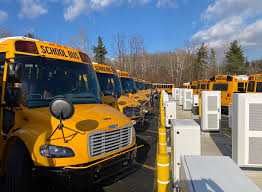In a groundbreaking study published in The Proceedings of the National Academy of Sciences, researchers from Harvard T.H. Chan School of Public Health have quantified the profound benefits of replacing diesel school buses with electric alternatives. The study reveals that each electric school bus could yield up to $247,600 in combined climate and health benefits, particularly in urban areas and among older bus fleets.
Led by senior author Kari Nadeau, the study underscores how transitioning to electric buses can significantly mitigate greenhouse gas emissions and improve public health outcomes. “Our findings provide robust evidence that the switch to electric school buses not only reduces air pollution but also saves lives,” remarked Nadeau, emphasizing the importance of such initiatives for both individual well-being and environmental sustainability.
The research focuses on comparing emissions from diesel and electric buses, highlighting that electric buses emit 181 fewer metric tons of carbon dioxide over their operational lifetime compared to their diesel counterparts. This reduction alone translates into $40,400 per bus in climate benefits. Moreover, the study identifies substantial health savings, totaling $43,800 per bus, attributed to decreased exposure to fine particulate matter (PM2.5), a major contributor to adult mortality and childhood asthma.
Geographically, large metropolitan areas stand to gain the most from electrifying school bus fleets due to their dense populations and higher levels of air pollution. For instance, in cities exceeding one million residents, the health benefits of replacing older diesel buses with electric models could reach $207,200 per bus.
Despite the clear advantages, the transition to electric school buses presents financial challenges for local, state, and federal decision-makers, given the initial investment required. However, the study’s findings provide compelling evidence that the long-term benefits outweigh these costs, particularly in urban settings where vulnerable populations, including racial minorities and low-income communities, bear the brunt of air pollution risks.
Looking ahead, the researchers advocate for further investigations into how electric buses impact children’s exposure to in-cabin air pollution during their daily commutes. Such insights could refine policy decisions and accelerate the adoption of cleaner transportation solutions across the United States.
The study, authored by Ernani Choma and Lisa Robinson alongside Nadeau, marks a critical step towards integrating health considerations into climate action strategies. As policymakers grapple with the imperative to curb emissions and protect public health, electrifying school bus fleets emerges as a pivotal solution with far-reaching benefits for individuals, communities, and the planet.












